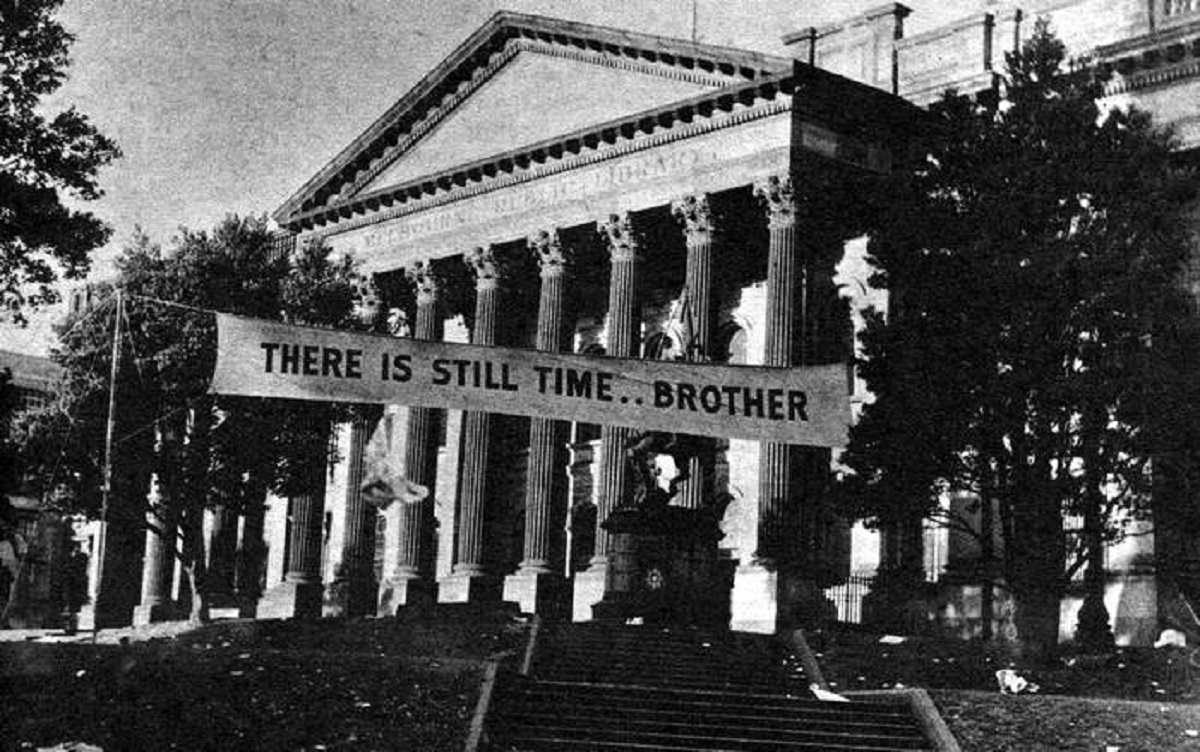 You may recognize this picture as the final scene in Stanley Kramer’s 1959 adaptation of Nevil Shute’s novel On the Beach. The book and film describe the aftermath following a nuclear war geographically isolated to the Northern Hemisphere. Falsely believing the Southern Hemisphere will be spared, the commander of a U.S. nuclear submarine (portrayed by Gregory Peck) heads for Australia, only to learn that, within months, down under residents will also succumb to radiation poisoning.
You may recognize this picture as the final scene in Stanley Kramer’s 1959 adaptation of Nevil Shute’s novel On the Beach. The book and film describe the aftermath following a nuclear war geographically isolated to the Northern Hemisphere. Falsely believing the Southern Hemisphere will be spared, the commander of a U.S. nuclear submarine (portrayed by Gregory Peck) heads for Australia, only to learn that, within months, down under residents will also succumb to radiation poisoning.
The banner reading “There is still time…brother,” which appears several times throughout the movie, is erected by the Australian Salvation Army. The message morphs over the course of the narrative. At first it is a cry for sanity, urging a halt to the stockpiling of nuclear weapons. In the end, it is a call to residents to make peace with themselves and their deity of choice before they perish.
When I drafted last Saturday’s post about red flag laws, I was unaware of the execution style massacre of five members of a family in Cleveland, Texas. It became the fifth incident in less than two weeks during which a gunman (yes, all males) shot at and wounded/killed someone who did nothing but make an honest mistake (e.g., getting into the wrong car or ringing the doorbell at the wrong house) or, in the most recent case, asked a neighbor to curtail firing his rifle at night as the noise kept their infant child from falling asleep.
Which brings me back to On the Beach. I now realize it is the perfect metaphor for the stockpiling of firearms, especially semi-automatic assault rifles, and the increasing probability that the slightest perceived offense will trigger the next mass shooting. In this allegory, Texas, after El Paso, Uvalde and Cleveland, is the Northern Hemisphere, a hair trigger away from the apocalypse. It has not happened yet, but sadly it is just a matter of time. Teenagers, enjoying a day on South Padre Island, will be playing their music a bit to loud. A young couple may be a little too affectionate in public. A dog escapes its leash. And a random stranger, after having one beer too many, will have ready access to the AR-15 he carries with him wherever he goes. Within seconds the sand will be strewn with mutilated, unrecognizable bodies.
“Why do we let people carry a weapon of war to the beach,” an eyewitness will ask. The NRA and gun manufacturers lobby will reply, “If only more good guys had guns, someone would have stopped him.” Where have I heard that before. Oh, right, we need to stockpile enough nuclear weapons to kill everyone on earth multiple times to ensure no one will use them. It is called “mutual assured destruction.” But all it takes is one error in judgment, miscalculation or system failure to become “assured destruction.”
“But that only happens in Texas,” you say. Echoing the Australians in On the Beach, you add, “I don’t live in Texas. I can survive the fallout as long as it is not generated in my state.” Not for long. Assault weapons do not respect state lines. They do not even respect international borders. The Mexican foreign ministry estimates over 500,000 firearms, a majority of which are AR-15 style assault weapons, were purchased legally in Texas in 2022 and transported across the border. They have become the major contributor to the wave of drug cartel violence, centered in Mexican states across the Rio Grande River from Texas
Instead of stemming the personal ownership of these weapons of war, many state legislatures make them easier to purchase and enable their presence in public places. Politicians who defend the Second Amendment over the inalienable right to life, liberty and the pursuit of happiness, glorify assault weapons in campaign ads and on Christmas cards. Is this not the same strategy employed by nuclear powers that parade their warheads and delivery systems through the streets on national holidays?
Nevil Shute has given us a preview of what America will look like if our leaders refuse to act. And reminds us, “There is still time…brother.” We should listen.
For what it’s worth.
Dr. ESP
Truth. Everyone should watch “On the Beach”. While there is still time.